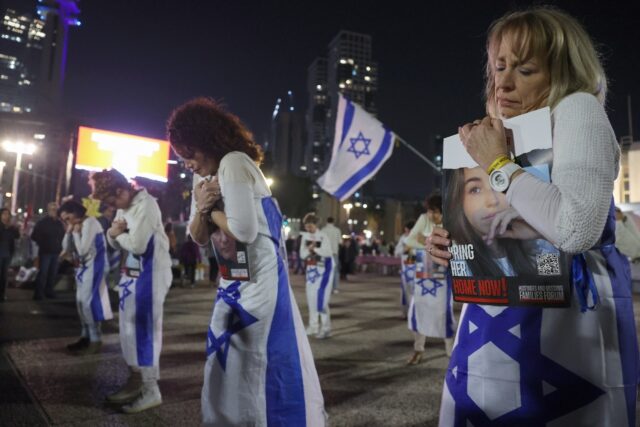Six months after Hamas’s October 7 attack, dozens of hostages are still languishing in captivity — a fact that for many Israelis has ruptured a foundational contract between them and their government.
“The Jewish people need protection, especially with who we live next to,” said Einat Avni Levi, whose family home is within sight of Gaza.
Five of her neighbours in the Nirim kibbutz community were killed and five more taken hostage by Hamas militants on October 7.
“If someone comes and takes me from my bed, I cannot live here if I don’t trust my army and my government to come get me,” she told AFP.
Most Israelis think their government has not done enough to free the 129 hostages still being held by Hamas, according to a poll last week by Israel’s Channel 12.
For Levi, 40, something fundamental has been shattered — a “bond” broken between the state and its people.
“Growing up and serving in the army, I always knew everything would be done to get me back,” said Shimon Attal at one of the recent rallies in Jerusalem for the return of the hostages.
“I knew they would not stop at anything,” the computer programmer told AFP. “And that made you feel safe.”
‘Moral obligation’
Rabbi Benny Lau said the concept is a bedrock of Israeli society.
“There is a covenant between the state and the citizens that no one will be left behind. You feel secure your leaders will do the maximum to bring you back,” he said.
But “when we are talking about a Jewish state it goes to another level, a sacred level,” he insisted.
“The idea of preserving life is so strong, it’s written in the Bible so many times,” Lau said. “We are all the image of God, so if you lose a person you are losing part of God.”
The rabbi said that sense of solidarity was reinforced by the centuries of persecution Jews suffered, when children and elders were kidnapped for ransom.
Even the head of Israel’s military, Lieutenant General Herzi Halevi, talks of this deep “moral obligation” and that Israel is ready to “pay a price for the return of its sons and daughters”.
Indeed, Prime Minister Benjamin Netanyahu — who many accuse of “abandoning” the Gaza hostages — exchanged 1,027 Palestinian prisoners for just one Israeli soldier, Gilad Shalit, in 2011.
It was the highest price Israel ever paid for a captive. One of those freed from jail was Hamas leader Yahya Sinwar, the man Israel says masterminded the October 7 attack.
‘In great danger’
But for a small minority like Tzvika Mor, whose eldest child Eitan is being held by Hamas, that price is too steep.
Mor said he would rather sacrifice his son than have him swapped for a Palestinian prisoner.
“We are not talking about the life of my son, we are talking about the existence of the Jewish state,” he said. “We are in great danger.”
“We do not want the hostages to be released at any price,” Mor added.
He said Eitan, 23, who was a security guard at the Supernova music festival — where 364 people were killed — always said, “‘Do not do a prisoner swap for me.’
“I hope he hasn’t changed his mind,” said Mor, a father of eight who founded the Tikvah group of more conservative hostage families.
“All our enemies should learn that they cannot start a war with Israel,” he said.
‘We want all back’
Yet the vast majority of the hostage families have a completely different view, saying “a deal has to be done”.
Only with the “return of the abducted” insisted Carmit Palty Katzir, the sister of hostage Elad Katzir, whose body was recovered last week, can “the contract between the citizens and the state be renewed”.
Rabbi Lau said any deal also has to respect the 34 hostages the Israeli military believes are already dead.
“We want all of them back,” he said, saying Jewish law dictates that every part and trace of a person, “right down to the bloodstains”, must be found and returned “to the earth to respect and honour what was made in the image of God”.
Until then, he said, no one in Israel should rest easy.
“All those people should be in front of our minds all day, every day.”

COMMENTS
Please let us know if you're having issues with commenting.